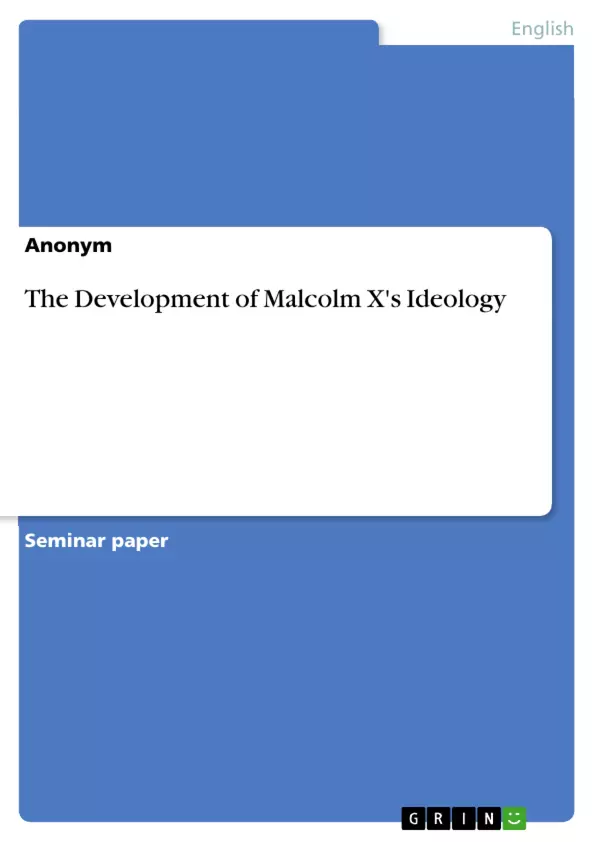This term paper is going to deal with the ideology Malcolm X developed throughout his life, with a special focus on his religion, his opinion on racial segregation and his identification with the United States.
Inhaltsverzeichnis (Table of Contents)
- Introduction
- The Early Life of Malcolm X
- Ideology during the Civil Rights Movement
- The Role of Religion and Racial Segregation
- National Identity
- Conclusion
Zielsetzung und Themenschwerpunkte (Objectives and Key Themes)
This paper aims to analyze the ideology of Malcolm X during the Civil Rights Movement in the United States. By exploring his early life and key beliefs, the paper seeks to understand why he was a controversial figure and how his experiences shaped his perspective on racial equality.
- The impact of Malcolm X's early life on his ideology
- The role of religion in Malcolm X's views on racial equality
- Malcolm X's perspective on racial segregation
- Malcolm X's concept of national identity and its relation to African Americans
- The influence of Malcolm X's ideology on the Civil Rights Movement
Zusammenfassung der Kapitel (Chapter Summaries)
The first chapter introduces the context of the Civil Rights Movement in the United States, highlighting the ongoing struggles for racial equality despite the abolition of slavery. It establishes Malcolm X as a key figure within the movement and contrasts his approach with that of Martin Luther King Jr.
The second chapter explores Malcolm X's early life, focusing on the challenges he faced and the experiences that shaped his views on racial injustice. The chapter discusses the influence of his family background, his childhood encounters with racism, and the factors that contributed to his evolving ideology.
The third chapter delves into Malcolm X's ideology during the Civil Rights Movement. It examines his beliefs about religion, racial segregation, and national identity, highlighting the complexities of his views and the factors that informed his approach to achieving equality.
Schlüsselwörter (Keywords)
Key terms and concepts explored in this paper include Malcolm X, Civil Rights Movement, racial equality, racial segregation, religion, national identity, African American history, and the impact of early life experiences on ideological development.
Frequently Asked Questions
What are the main themes of the paper on Malcolm X's ideology?
The paper focuses on the development of Malcolm X's ideology, specifically his views on religion, racial segregation, and his national identity as an American.
How did Malcolm X's early life influence his later beliefs?
The research explores how his childhood experiences with racism and his family background shaped his radical perspective on racial injustice and the need for equality.
What was Malcolm X's stance on racial segregation?
Unlike other civil rights leaders who fought for integration, Malcolm X initially advocated for racial separation as a means for African Americans to build their own self-sufficient community.
How did religion play a role in his ideology?
The paper examines his involvement with the Nation of Islam and how his religious faith was central to his message of Black empowerment and his critique of white supremacy.
How did Malcolm X's approach differ from Martin Luther King Jr.?
While King is known for non-violent civil disobedience and integration, Malcolm X was often viewed as a more controversial figure who emphasized self-defense and Black nationalism.
- Citar trabajo
- Anonym (Autor), 2018, The Development of Malcolm X's Ideology, Múnich, GRIN Verlag, https://www.grin.com/document/1266567



